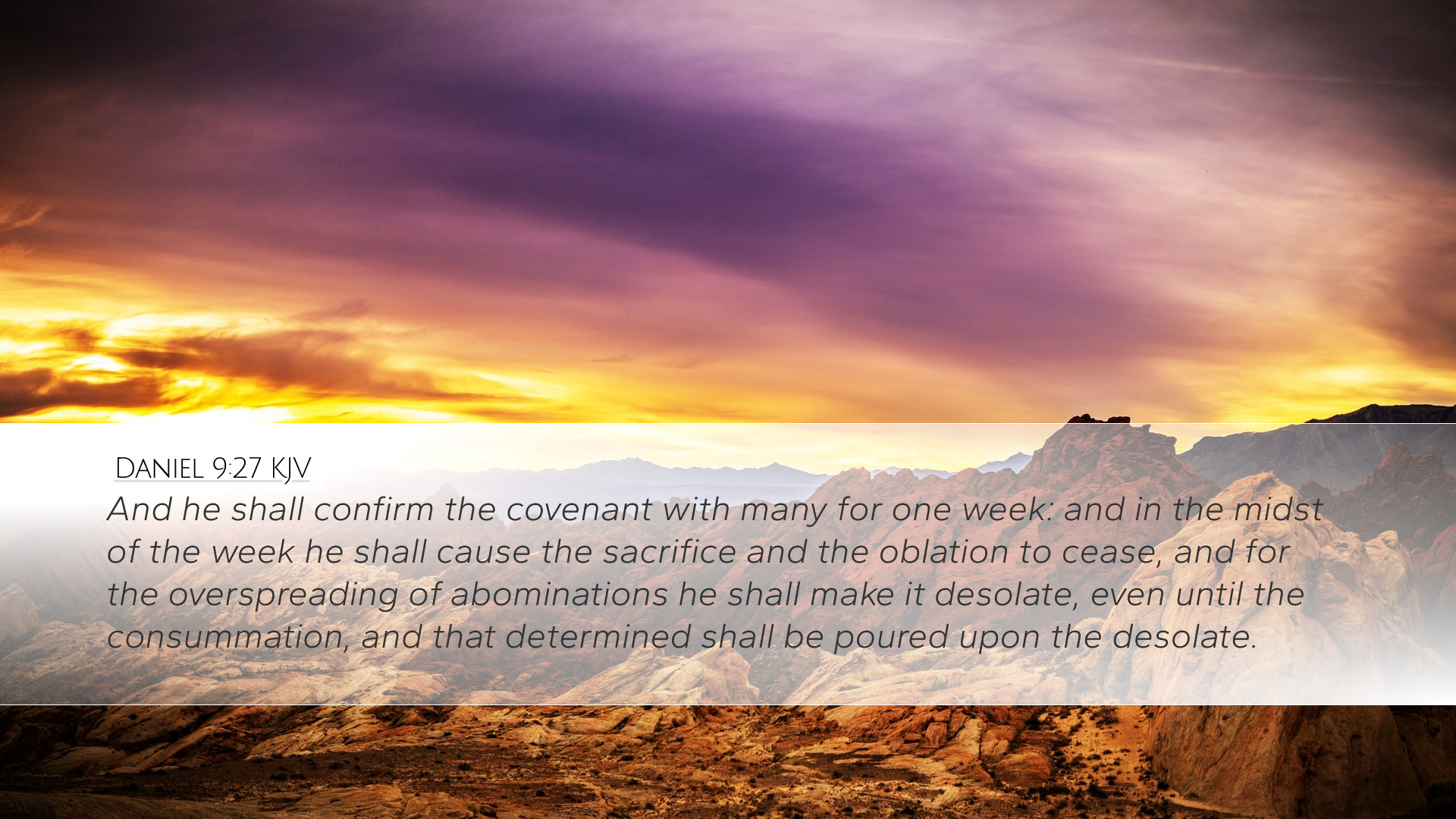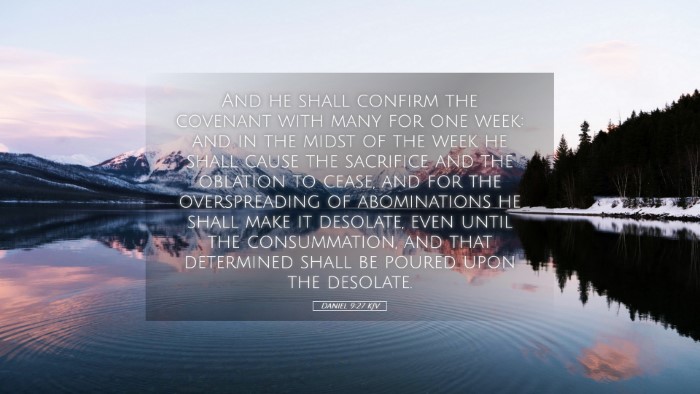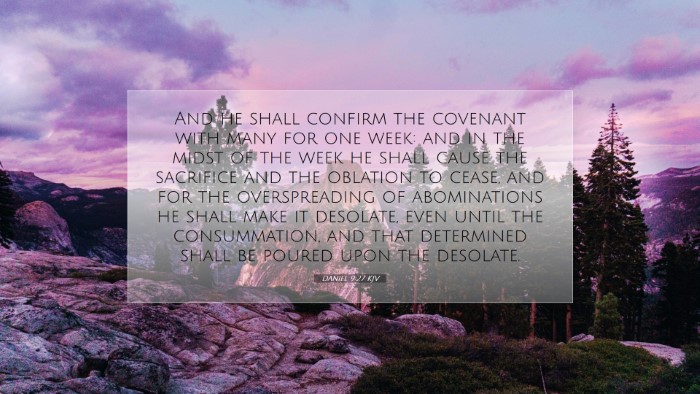Commentary on Daniel 9:27
Introduction
The verse Daniel 9:27 presents a pivotal point in eschatological studies. It reads, “And he shall confirm the covenant with many for one week: and in the midst of the week he shall cause the sacrifice and the oblation to cease, and for the overspreading of abominations he shall make it desolate, even until the consummation, and that determined shall be poured upon the desolate.” This verse encapsulates key themes of covenant, sacrifice, and desolation, which are essential for understanding prophecy in both the Old and New Testaments. The following commentary draws from respected public domain sources to provide meaningful insight.
Understanding the Context
Before delving into the verse, understanding the immediate context within Daniel's prayer and the prophetic background is crucial. Daniel is seeking God’s intervention regarding the sins of his people and the desolations of Jerusalem. The timing of this revelation is significant, as it ties to the seventy weeks prophecy, indicating a precise divine timetable.
Verse Breakdown
“And he shall confirm the covenant with many for one week”
Matthew Henry explains that “he” refers to a significant leader or prince, often identified with the coming Messiah or a future ruler in eschatology. The phrase “confirm the covenant” suggests a strengthening or establishing of a previously existing covenant. This has been interpreted both as the covenant of grace through Christ and the covenant with Israel.
Albert Barnes asserts that this “week” symbolizes a period of seven years, corresponding to the prophetic formula of Daniel, implying that during this time, a definitive relationship with many will be solidified, reflecting restoration and potential redemption.
“And in the midst of the week he shall cause the sacrifice and the oblation to cease”
This segment is critical, as it points to a turning point within the prophetic timeline. Adam Clarke notes that the cessation of sacrifices suggests a pivotal shift from the Old Testament sacrificial system, anticipating the ultimate sacrifice of Christ. He argues that the “midst” of the week signifies a divine interruption where offerings are rendered powerless, marking an end to the ritualistic practices that led to spiritual complacency.
“And for the overspreading of abominations he shall make it desolate”
The mention of “overspreading of abominations” raises the theme of idolatry and spiritual defilement. Matthew Henry highlights that this indicates a judgment upon unfaithfulness, reflecting the seriousness of covenant breaking. The desolation spoken of can be viewed as a foreshadowing of the devastation that would come upon Jerusalem and the eventual destruction of the Temple, as noted by Jesus in the Gospels.
“Even until the consummation, and that determined shall be poured upon the desolate”
The final portion suggests an ultimate end to the desolation, where divine judgment is made complete. Albert Barnes views “consummation” as a time when God’s purposes will be fully realized. This reinforces the eschatological dimension, emphasizing that the current sufferings and judgments are part of God’s larger, redemptive plan.
Theological Implications
The implications of this verse resonate deeply in theological discourse. It invites discussions about the nature of covenants, the fulfillment of prophetic timelines, and the ultimate reconciliation of Israel and the Gentiles through Christ.
- Covenantal Theology: The promise of a covenant reflects God's unyielding commitment to His people, leading to discussions on the New Covenant established through Christ.
- Christology: The interpretation of “he” as referring to Christ emphasizes the centrality of Jesus in redemptive history and His sacrificial role as the fulfillment of the Law.
- Eschatology: Understanding the “weeks” prophecies offers a lens through which to view future events concerning the end times, providing essential commentary on the return of Christ.
Historical Perspectives
Throughout history, various scholars and theologians have examined this verse, contributing to a rich tapestry of interpretations:
- Early Church Fathers: Interpretations by figures such as Irenaeus focused on the prophetic implications for the coming of Christ and the establishment of His kingdom.
- Reformation Views: Reformers like John Calvin saw in this passage a testament to God's sovereignty and the unfolding of His redemptive plan throughout history.
- Modern Scholarship: Contemporary theologians have expanded upon historical interpretations, integrating archaeological and cultural studies to enhance understanding.
Application for Today
For pastors, students, and scholars, Daniel 9:27 holds significant application today:
- Understanding Covenant: Engaging with the concept of covenant can deepen one’s appreciation for the faithfulness of God and the call to uphold His commandments.
- Awareness of Judgment: The severe warnings against abomination serve as a crucial reminder of the consequences of turning away from God’s ways.
- Eschatological Hope: The promise of consummation encourages believers to remain steadfast in faith amid trials, knowing that God’s ultimate plan unfolds towards restoration.
Conclusion
Daniel 9:27 encapsulates profound themes of covenant, sacrifice, and judgment that resonate through Scripture. As such, it invites continual reflection and study from believers seeking to understand God's purposes in history and their own lives. Drawing from the rich tradition of biblical commentary enhances our grasp of this text, making it a cornerstone for eschatological study and a catalyst for faith and worship.


